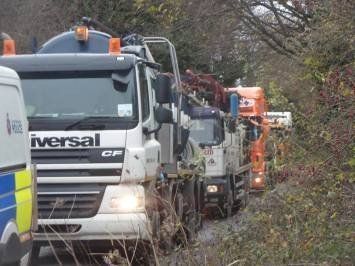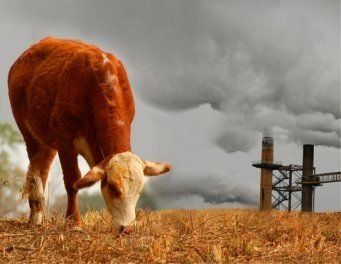IMPACT ON PUBLIC HEALTH
The latest report from the UK government on fracking and health was published back in July 2014 - yet over 80% of peer-reviewed scientific studies published since then show that fracking is a threat to public health, air and water quality. There is now convincing scientific evidence that fracking can danger to the health and well-being of people living near well-sites, with several studies pointing to an increase in premature births, miscarriages, birth defects, migraines, childhood asthma, and other lung and skin diseases.
Please continue reading to see some of the many reviews, research papers, articles and reports about fracking and health.
CONCERNED HEALTH PROFESSIONALS OF NEW YORK COMPENDIUM
"Our examination…uncovered no evidence that fracking can be practiced in a manner that does not threaten human health," states a damning 266-page report
released by Concerned Health Professionals of New York and the Nobel Peace Prize-winning group, Physicians for Social Responsibility.
One of the most thorough and wide-ranging reviews of current evidence has been conducted by The Concerned Health Professionals of New York, which publishes a Compendium of relevant research on fracking. This research was instrumental in New York State’s decision to ban fracking in 2015. The fifth edition of this Compendium was published in March 2018 and reviews hundreds of studies on the impacts of fracking and is available here.

Here are some of the report’s main conclusions:
Growing evidence shows that regulations are simply not capable of preventing harm.
Cases of drinking water sources contaminated by drilling and fracking activities, as well as associated waste disposal, are now proven.
Drilling and fracking emissions contribute to toxic air pollution and smog (ground-level ozone) at levels known to have health impacts.
Public health problems associated with drilling and fracking, including reproductive impacts and occupational health and safety problems, are increasingly well documented
One telling comment from the report’s conclusion is as follows: "There is no evidence that fracking can operate without risks to human health. Any claims of safety are based on wishful thinking.”
Another interesting read is the Public Health Review produced by the New York State Department of Health, which you can find here.
This was the report that was instrumental in bringing about a ban on fracking in the state, on the grounds that fracking would result in a serious risk to public health. You can read reports of the ban in the New York Times
and Huffington Post. Dr. Howard A. Zucker, NY State Health Commissioner, said on the publication of the report: “Would I let my family live in a community with fracking? The answer is no. The potential risks of fracking are too great. In fact, they are not even fully known."

THE MEDACT REPORT
In 2016 the UK organisation Medact reviewed over 350 academic papers published in the previous twelve months on the impacts of fracking for shale gas in the following areas: air and water quality, health, climate change, social well-being, economics, noise and light pollution and seismic events.
The Medact Report concluded that there are risks of the following:
(i) adverse reproductive outcomes due to exposure to endocrine disrupting chemicals
(ii) risk of respiratory effects resulting from ozone and smog formation
(iii) stress, anxiety and other psycho-social effects arising from actual and perceived social and economic disruption.
You can read a summary of the report here, or download the full report here. It’s not very long, as these reports go, so well worth a read if you have the time.
Following the release of this report, Medact released a statement
saying that “hydraulic fracturing for shale gas (‘fracking’) poses significant risks to public health and calls for an immediate moratorium to allow time for a full and comprehensive health and environmental impact assessment (HIA) to be completed.”
An open letter
about the report was also published in the British Medical Journal and signed by 18 health care professionals, which concluded: “The arguments against fracking on public health and ecological grounds are overwhelming. There are clear grounds for adopting the precautionary principle and prohibiting fracking.”
PSE HEALTHY ENERGY REPORT
Another important and wide-ranging review of current peer-reviewed research was conducted by PSE Healthy Energy, a multi-disciplinary scientific research institute that supports the adoption of evidence-based energy policies. Their 2016 review
of relevant scientific literature from 2009-15 focused on human health, water quality and air pollution. This review states that at least 685 papers have been published in peer-reviewed scientific journals during that time frame which are relevant to assessing the impacts of fracking.
Of these:

84% of public health studies contain findings that indicate public health hazards, elevated risks, or adverse health outcomes
69% of water quality studies contain findings that indicate potential, positive association, or actual incidence of water contamination
87% of air quality studies contain findings that indicate elevated air pollutant emissions and/or atmospheric concentrations.If you’d like this information on a handy downloadable PDF, click here. You can also read a summary of this this report here.
The PSE Healthy Energy report was cited in this Mail online article, which highlighted a variety of health issues that could affect more than 17 million Americans who live within one mile of a fracking well-site.
THE CHEM TRUST
Another respected organisation that has concluded that fracking could be harmful to human health is The Chem Trust,
a UK registered charity that works at European, UK and International levels to prevent man-made chemicals from causing long term damage to wildlife or humans. Their wide-ranging study
was published in 2015, and Chem Trust Executive Director Dr Michael Warhurst said: “Widespread fracking will threaten many of our valuable wildlife sites, as this technology has a high potential to pollute sensitive aquatic ecosystems; it can also harm human health.”
RESEARCH RELATED TO SPECIFIC ILLNESSES
There are numerous peer-reviewed research papers that point to a connection between fracking and specific illnesses. Here are a few of the most widely reported ones. If you’d like to delve deeper, a good place to go is ROGER (Repository for Oil and Gas Energy Research), which is an exhaustive database of all relevant fracking research.

New paragraph
PREMATURE BIRTH AND HIGH RISK PREGNANCIES
A peer-reviewed research paper
published by Johns Hopkins Bloomberg School of Public Health shows that expectant mothers who live near fracking wells in Pennsylvania are at an increased risk of giving birth prematurely and for having high-risk pregnancies. Study leader Brian S. Schwartz, MD, states: “The growth in the fracking industry has gotten way out ahead of our ability to assess what the environmental and, just as importantly, public health impacts are.”
For a hard-hitting report on premature deaths in Utah, and their possible links to the fracking industry, read this in-depth Rolling Stone
investigation.
HEART ATTACKS
Research studies
in Pennsylvania have found that drilling and fracking activities have been associated with a 27% increase in cardiology hospitalisations for people living near fracking wells.
ASTHMA
Another research paper
from the Johns Hopkins Bloomberg School of Public Health research shows that people with asthma who live near bigger or larger numbers of active unconventional natural gas wells operated by the fracking industry in Pennsylvania are 1.5 to four times likelier to have asthma attacks than those who live farther away
INFERTILITY, LOW BIRTH WEIGHT, MISCARRIAGES
Research published in Reviews
on Environmental Health concluded that exposure to chemical pollution near fracking well-sites can be linked to reproductive and developmental health impacts including infertility, miscarriage or spontaneous abortion, impaired fetal growth, and low birth weight.
Another study by the University of Pittsburgh
found that babies born to mothers near fracking wells in Pennsylvania had a lower birth weight compared to babies born away from fracking sites.
You can read a summary of this research and its implications for the fracking industry in The Ecologist.
SKIN CONDITIONS
A Yale University
study found that people living near fracking wells had increased numbers of skin conditions and upper respiratory conditions. The study included 180 randomly selected households and 492 people in Washington County, Pennsylvania, and is “the largest study to date of general health status of people living near gas wells,” said Rabinowitz, first author of the study and an associate professor in the University of Washington’s School of Public Health. “The major symptoms seem to be upper-respiratory symptoms,” including “coughing … itchy eyes, nosebleeds as well as skin problems such as rashes, itching and burning,” Rabinowitz said.
MIGRAINES, NASAL PROBLEMS, FATIGUE
Research by Johns Hopkins Bloomberg School of Public Health
show that residents living near fracking wells are nearly twice as likely to suffer from a combination of migraine headaches, chronic nasal and sinus symptoms, and severe fatigue.
WHAT DOES THE UK GOVERNMENT HAVE TO SAY?
Whenever the government is challenged on the health impacts of fracking, their response is always the same. They point to a Public Health England report
published in October 2013 which concluded, “Public Health England anticipates a low risk to public health from direct releases of chemicals and radioactive material if shale gas extraction is properly operated and regulated.”

However, this report only drew on selected research that had been published by December 2012 – and as the PSE Energy have stated, over 80% of the peer reviewed papers on the health and environmental impacts of fracking have been published since that date. For more on the selective nature of this report, please read this article
in The Ecologist which is certainly recommended for anyone who is interested in the way this report was compiled.
The Public Health England report was updated and published
in its final form in June 2014, with a note saying, “The report has been updated in the light of new significant scientific evidence in peer reviewed or published reports, up to January 2014.” The report also stated that “There have been no significant changes to the findings in the draft report, PHE-CRCE-002, which was published for comment in October 2013.”
However, there have been literally hundreds of peer-reviewed health studies since January 2014, and – as the research from PSE Healthy Energy cited above shows – the overwhelming majority of these point towards a range of health problems related to fracking. Indeed, worrying new research on the health impacts of fracking is published so regularly that it is hard to keep up.
However, the government still have not updated their report, and at the time of writing have no plans to do so. Given the weight of research pointing to the dangers of fracking that has been published since the PHE report, it is perhaps not hard to understand why they are so reluctant.
Copyright © All Rights Reserved.
